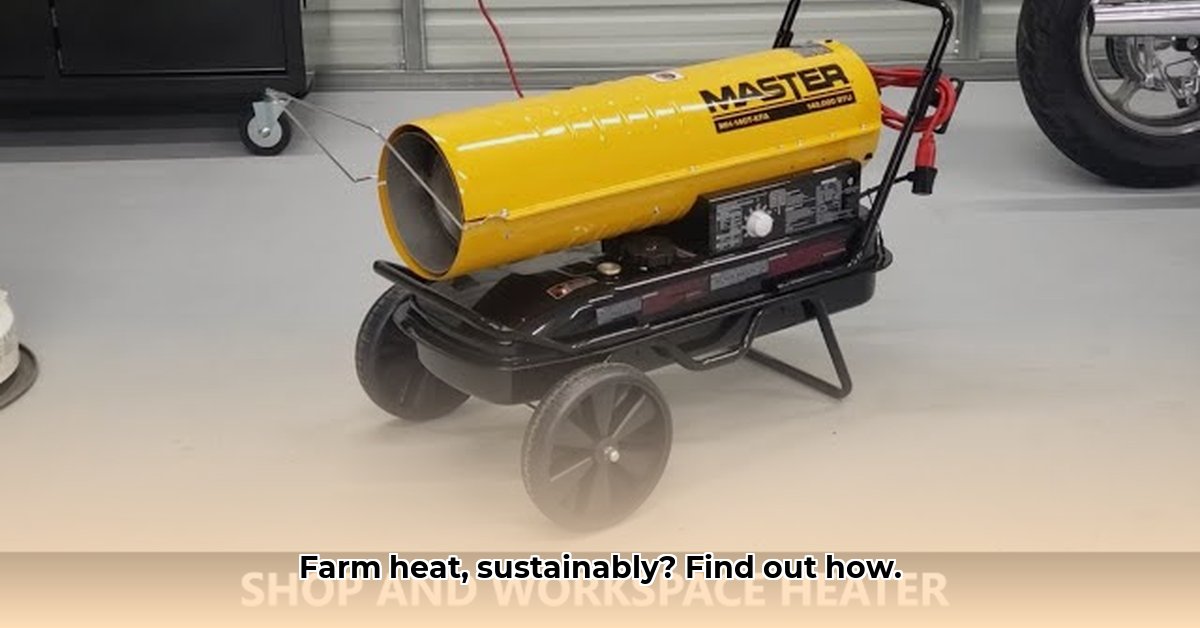
Keeping your farm productive year-round, especially in challenging climates, requires reliable heating solutions. Diesel heaters, widely available at Tractor Supply, offer a powerful and efficient method for warming barns, greenhouses, and workshops. For backup power options, consider exploring generator options. This guide provides a comprehensive approach to selecting, installing, operating, and maintaining these heaters sustainably and safely.
Choosing the Right Diesel Heater
Selecting the optimal diesel heater depends on various factors. Budget considerations are crucial, as heaters vary significantly in price based on power output and features. Consider the space you need to heat; a large barn demands a much higher BTU (British Thermal Unit – a measure of heat energy) output than a small greenhouse. Tractor Supply offers various models with differing BTU ratings and fuel efficiency (gallons of diesel consumed per hour). Higher BTU generally means more heat, but also higher fuel consumption. Fuel efficiency is paramount for cost savings and environmental responsibility. Prioritize models with features such as thermostats for precise temperature control and automatic shutoffs for safety. Before purchasing, review online user reviews for real-world feedback on different models.
Safe Installation and Operation
Safety is paramount when using diesel heaters. Always adhere to the manufacturer's instructions provided with your specific heater model. Improper installation or operation can lead to serious hazards, including carbon monoxide poisoning.
Step-by-Step Guide:
Ventilation: Ensure adequate ventilation to prevent carbon monoxide buildup. Open windows, use exhaust fans, and maximize airflow. This is critical for safety.
Fuel Lines: Use only manufacturer-approved fuel lines and connectors. Regularly inspect for cracks or leaks; repair or replace any damaged components immediately.
Exhaust System: Position the exhaust pipe safely away from flammable materials, ensuring proper venting to the outside. Never obstruct the exhaust.
Stable Placement: Place the heater on a level, stable surface, far from combustible materials. Maintain a clear perimeter around the heater.
Operational Procedures: Thoroughly understand all controls and safety features before starting the heater. Never leave a running heater unattended, and monitor for unusual noises or smells.
Fuel Efficiency and Emission Reduction
Optimizing fuel efficiency reduces operating costs and minimizes environmental impact. Several strategies can help:
Regular Maintenance: Regular cleaning and maintenance, including air filter replacement, are crucial for optimal performance. Clogged filters reduce efficiency, leading to increased fuel consumption.
Fuel Quality: Using high-quality diesel fuel improves combustion, resulting in better fuel economy and fewer emissions.
Thermostat Use: Employ a thermostat to maintain a consistent temperature, avoiding unnecessary fuel consumption.
Ventilation Balance: While adequate ventilation is essential, excessive ventilation wastes heat. Strive for a balance between safety and efficiency.
Troubleshooting Common Problems
Even with proper maintenance, occasional issues might arise. Here are some common problems and solutions:
Heater Won't Start: Check the fuel supply and electrical connections. A faulty glow plug (which ignites the diesel fuel) might require replacement.
Insufficient Heating: A clogged air filter or obstructed exhaust can reduce heating efficiency. Clean or replace the filter and check the exhaust for blockages.
Unusual Noises: Unusual noises indicate a potential mechanical problem. Contact a qualified technician or service provider for repairs.
Maintenance and Servicing
Regular maintenance extends the heater's lifespan and ensures safe, efficient operation. Establish a maintenance schedule:
Weekly Inspection: Check fuel lines for leaks and the exhaust system for damage.
Monthly Cleaning: Clean the air intake filter to optimize airflow.
Annual Professional Service: Arrange for an annual professional inspection and servicing, including checking the fuel pump, burner, and other internal components. Replace the fuel filter as needed.
Disposal and Recycling
Proper disposal of used diesel heaters, filters, and waste fuel is essential. Contact your local waste management facility or Tractor Supply for guidance on recycling or proper disposal methods.
Sustainable Farming Practices: Integrating Precision Irrigation and Cover Cropping
While not directly related to diesel heaters, integrating precision irrigation and cover cropping significantly enhances sustainable farming practices. Precision irrigation optimizes water usage, while cover cropping improves soil health and nutrient cycling. These methods combined result in increased yields and reduced environmental impact. A soil test is the first step, followed by cover crop selection suited to your soil and climate. Careful irrigation system design, planting, monitoring, and management are crucial for successful integration. Consider the long-term benefits of integrating these practices for a more resilient and productive farm operation. This holistic approach yields significant improvements in water use efficiency, increased yields, and enhanced soil health.
Key Takeaways:
- Diesel heaters offer efficient farm heating but require careful, safe operation and maintenance.
- Regular maintenance and fuel quality are crucial for fuel efficiency and emissions reduction.
- Integrating precision irrigation and cover cropping promotes sustainable farming methods, leading to improved yields and environmental sustainability.
This guide provides a comprehensive framework for sustainable diesel heater usage on your farm. Remember to prioritize safety and follow manufacturer recommendations for optimal results.